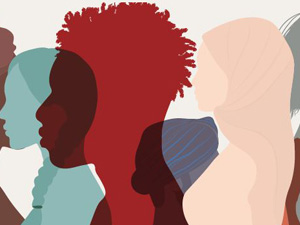
Reprinted from the summer 2021 Issue of The Ohio Family Physician
By: Christen Johnson, MD, MPH, 2020-21 American Academy of Family Physicians Health Equity Fellow
The COVID-19 pandemic highlights the health disparities shaped by the social determinants of health that are created by systemic racism. With the recent attention given to racial inequities, the medical community has rushed to seek answers for and solutions to these inequities. While searching for ways to improve care for Black, Indigenous, and People of Color (BIPOC) in America today, one may fail to consider the historical implications of racial biases and systems shaped by biased practices on current circumstances which complicate the road to equitable health care for all.
Bias in Medicine Historically and Today
Evolutionarily, the human brain created biases for protection. In society, these biases stem from subtle, subliminal, and overt messages accumulated from external stimuli. Race was used as a marker of humanity making racial inequities in health care societally acceptable at the dawn of American history. Aside from genocide by other means, Native Americans were used for disfiguring medical experiments.1 In the 1800s, enslaved Black people were used in medical experimentation.2 Often without necessary treatments or anesthesia for experimental surgery, Black women were used in the initial trials of what would become common-day gynecological surgeries.2 After emancipation, racial biases still saturated standards for ethical experimentation and access to care. While the Tuskegee Syphilis Experiment of the 1930s has been well documented,2 similar syphilis experiments were carried out by the U.S. internationally in Latino populations and “intentionally” exposed patients by contaminated instruments.3 Henrietta Lacks went untreated for cervical cancer while her cell samples were used for professional gain in the birth of the HeLa cell line.2 The 20th century displayed additional examples of “involuntary hysterectomies” including that of Fannie Lou Hammer, experimental birth control, and eugenics practices against BIPOC women.2
Many transgressions have since been repented, but the root of their cause, systemic and individual racial biases, remain.2,4 Collectively, the accepted American values stem from a white, cis-gendered, heterosexual, able-bodied, middle class standard. Biases are formed when differences are associated negatively. Explicit biases, like overt racism, are less socially acceptable, but still occur. Implicit biases remain the prominent source of racism and microagressions because of their insidious nature; they go unseen and often unrecognized, yet impact decisions and behaviors.5 Because biases are pervasive and can impact one’s judgements and perceptions of both patients and colleagues, they can unknowingly impede empathetic communication and impact relationships.2,4
What happens when these biases are engrained in a profession? The Social Categorization of Medicine is a phenomenon that describes the way in which biases against patient populations are perpetuated in medical education.6 As medical education follows an apprenticeship model, biases are easily passed alongside medical knowledge. Just as previous generations falsely generalized Black people to feel less pain due to “thicker skin” and assumptions have been made about BIPOC patients including unhealthy incorporations of cultural identity, trainees become sensitized to these interactions and display similar biases today.5,6 This impedes shared decision making and damages the physician-patient relationships that can be formed with BIPOC patients, further perpetuating the health disparities we aim to overcome. Examples of this can even be seen in the rhetoric that we use surrounding COVID-19 vaccine hesitancy. There is much discussion about the particular mistrust of the medical profession by the Black community. In knowing the historical significance of their previous exploitation, can we continue phrasing these concerns as a problem rather than asking “how has the way that the medical community has damaged trust with Black Americans impacted vaccine uptake?”
Proposed Solutions
There is no easy answer to challenging these biases in medicine. Because they are ingrained in the culture and systems of medicine, solutions call for both individual and systemic change.2,4,5
Making individual change includes accepting that every human has biases.4,7 These can be identified through exercises like the Implicit Association Test created by Harvard University. For many, the natural responses to these topics can be uncomfortable in the least, including feelings of guilt and disbelief.4,7 Once identified, one must actively counter biases. To do this, one must learn more about systemic racism and the experiences of BIPOC in America.4 It is suggested that one educates themselves rather than relying on others to assist in closing gaps. Fortunately, there are several resources including books and videos suggested by the Ohio Academy of Family Physicians and the American Academy of Family Physicians.8 Scholars also recommend participating in open-forum discussions to assist in identifying additional areas for development and forming supportive bonds with others working towards equity.7
Representative inclusion is key for creating change that can rectify the flaws in the current systems, but takes much longer to achieve. Aside from research and policy changes, one method includes inspiring culture change through medical education.4,6 A dedication to diversifying the medical workforce, curricula including health equity and anti-bias training, and culturally-equitable professionalism standards in medical education are a good springboard in challenging the Social Categorization of Medicine.4,6 Matched with individual changes, new physicians can be trained in inclusive spaces and equipped with the tools needed to provide equitable and culturally sensitive care for all patients.
References available on the OAFP website.




